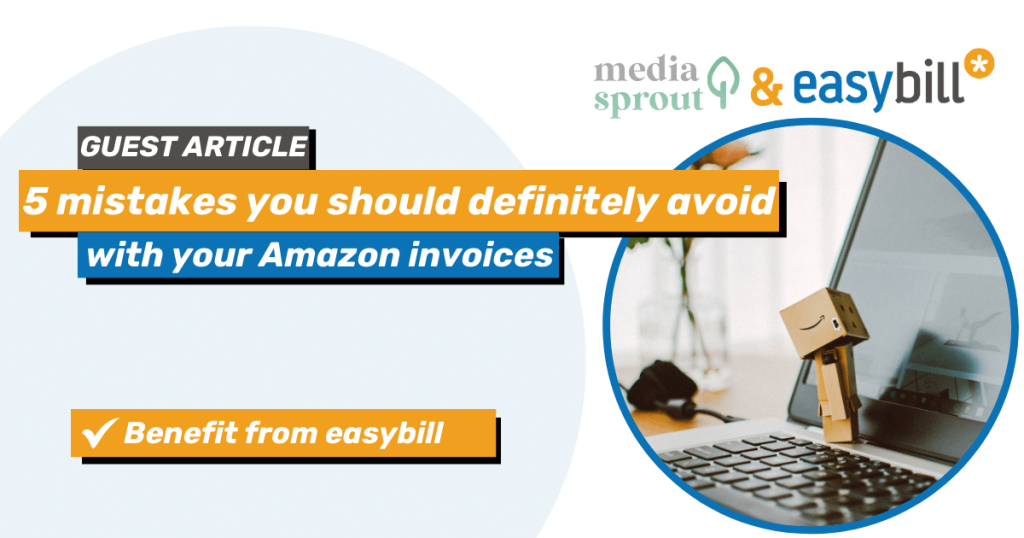
Guest article: Martin Böcker, MediaSprout
You are active as a seller on Amazon and sales are finally up. Every free resource is put into improved marketing and acquisition. Bookkeeping and invoicing in particular are often neglected – you can take care of that later. Read the following article to find out why this is an expensive mistake and what other things you should definitely avoid with your Amazon invoices.
#1 Neglecting invoices
In order to achieve sustainable success as an Amazon seller, the focus on the products and their distribution is the most important pillar.
“The main thing is to get the money in first!” – This attitude often means that clean invoicing is pushed far down the list of priorities.
As an Amazon seller, issuing invoices is a legal requirement. Missing or incorrect invoices can lead to legal problems for your company. If the buyer has an Amazon Business account, it is even mandatory that the invoice is available for download within 24 hours of shipping.
In addition, inaccurate or missing invoices can lead to delays in payment by the customer, which has a negative impact on your cash flow. If invoices are only created on request or you have to make corrections, this also means additional time expenditure. You could invest this unnecessary extra work much more profitably in growth or marketing.
Professional and smooth invoice management also creates trust with your customers. If invoices are incorrect, inaccurate or issued late, this does not create a good image of you as a seller and often leads customers to draw conclusions about the quality of your products.
Our tip: Give your invoices and invoice management a high priority right from the start. If you set up the process in a well thought-out way and ideally use a tool like easybill, it will save you a lot of headaches later on. That’s a promise!
#2 Mandatory information forgotten
Invoice amount, product, company logo and a few more lines – that must be enough, right?Unfortunately not! As an Amazon seller, it is essential to include all legally required information on your invoices. According to § 14 Para. 4 in conjunction with § 14a Para. 5 UStG, proper invoices to companies must contain the following information. § 14a para. 5 UStG in Germany, the following information must be included:
- Full name and address of the supplier and the recipient of the service
- Tax number and/or sales tax identification number
- Date of issue of the invoice
- Consecutive invoice number
- the quantity and customary designation of the delivered items or the type and scope of the other service
- Time of delivery or performance
- Compensation broken down by tax rates and exemptions
- Reductions in the fee agreed in advance
- Remuneration and amount of tax due thereon and reference to tax exemption
- If applicable, reference to tax liability of the recipient of the service
For other countries, further points may need to be considered.
Complete invoices are particularly important in B2B business. Your business customers need detailed invoices in order to claim input tax from the tax office. An incorrect or incomplete invoice can result in the input tax deduction being refused – and this can quickly lead to resentment and possibly even the loss of valuable business partners.
Even if you think that only private customers order from your Amazon store anyway: Just make sure you have proper invoices to avoid legal problems and extra work.
Missing mandatory information on an invoice is not only annoying, but can also have legal consequences. During an audit, the tax office can demand that all invoices be corrected. In the worst case, you could even face additional payments, fines or criminal prosecution.
Professional accounting and invoicing systems such as easybill complete and check this information automatically so that you are on the safe side and can focus entirely on your business.
#3 Not filing invoices cleanly
Although you can view all invoices in your Seller Central, this has little to do with proper and clear filing. Storing everything in different folders or in different cloud systems may be a recipe for success for your private photos, but for the bookkeeping of your Amazon business, it’s more of a recipe for chaos and confusion.
Legal retention obligations require invoices to be archived correctly for a certain period of time. In the event of a tax audit, you must be able to present all relevant documents quickly and completely. A disorganized filing system or a defective hard drive as the only storage location for all invoices can lead to delays and unnecessary stress.
You will benefit most from a clean and organized invoice filing system in your daily work. A well thought-out structure enables you to access specific invoices quickly and efficiently, whether for internal checks, customer queries or when creating reports.
Think about a sensible system for organizing your invoices. Ideally, your system should be so easy to understand that not only you but also your colleagues will find it easy to use.
#4 Write invoices manually
What’s Microsoft Word for, including lots of templates? It would be a laugh if I didn’t write my own invoices quickly.
Caution: Manual invoicing is a huge source of error. Typing errors, inaccuracies or other discrepancies can quickly creep in, which can lead to problems with customers and accounting issues.
It is also very time-consuming to create every invoice yourself. Especially as your business grows, you should stop wasting your time typing up invoices.
The most obvious alternative is the free Amazon invoicing service. However, this has a decisive disadvantage: subsequent invoice corrections are very difficult to make. We therefore strongly advise you to use a professional invoicing tool such as easybill.
#5 E-Rechnungen ignorieren
One component of the Growth Opportunities Act, which was passed by the Bundestag in 2024, is the switch to e-invoices from January 1, 2025. It is the idea to gradually establish a situation where B2B transactions only take place using e-invoices. The aim is to ensure that all companies can receive e-invoices by 2025. The creation of e-invoices should then be mandatory for all companies by 2028. In order for invoices to be electronically readable, it is crucial that they are created in a suitable, structured format such as XML (XRechnung), UBL or EDIFACT. So this is definitely the time to say goodbye to Word invoices and switch to a professional tool.
You can read more about the structure and the switch to e-invoices here.
E-invoices will also become mandatory for Amazon when delivering to companies. E-invoices are not just an annoying additional expense for Amazon sellers, but also offer a number of advantages:
- Greater efficiency through automated processes
- Environmentally friendly by dispensing with paper
- Secure thanks to encryption and digital signatures
- Automatically meets technical and formal standards
- Simple archiving and faster access
It’s best to start thinking about switching to e-invoicing now to avoid chaos and hassle later on when things suddenly become urgent. You will benefit immediately from the efficiency gains and can enjoy the advantages of e-billing now.
By using a specialized tool such as easybill, you are on the safe side. With easybill, for example, you can already create e-invoices in various formats.
Conclusion
Creating and managing invoices offers Amazon sellers a number of pitfalls that can cost you dearly. If you give the topic the necessary importance right from the start, you can avoid unnecessary extra work and regular annoyances.
With easybill, you are on the safe side and can rest assured that your invoices contain all the necessary information. You also save valuable time with every invoice, which you can use to improve your sales success on Amazon.
Martin Böcker, MediaSprout
Martin Böcker is the founder of MediaSprout. He has been helping accounts improve their performance on Amazon and other marketplaces for more than 6 years. His core areas include general strategic consulting, Amazon PPC and Amazon SEO. But he and his team also focus on product images, A+ content and brand stores!
Read also:
Efficient shipping management: shipment data export and tracking for your online store
Link Amazon with easybill (german help center)
New feature: Automated eBay credit notes in easybill
